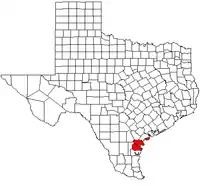
The Corpus Christi metropolitan statistical area is a metropolitan area in South Texas that covers two counties, Nueces, and San Patricio. As of the 2000 census, the MSA had a population of 413,280 (though a July 1, 2013 estimate placed the population at 442,600).[1]
Counties
Communities
Places with more than 300,000 people
- Corpus Christi (principal city)
Places with 10,000 to 20,000 people
Places with 1,000 to 10,000 people
Places with 500 to 1,000 people
Places with less than 500 people
Demographics
| Census | Pop. | Note | %± |
|---|---|---|---|
| 1900 | 10,439 | — | |
| 1910 | 21,955 | 110.3% | |
| 1920 | 22,607 | 3.0% | |
| 1930 | 51,779 | 129.0% | |
| 1940 | 92,661 | 79.0% | |
| 1950 | 165,471 | 78.6% | |
| 1960 | 273,600 | 65.3% | |
| 1970 | 293,734 | 7.4% | |
| 1980 | 340,488 | 15.9% | |
| 1990 | 367,786 | 8.0% | |
| 2000 | 403,280 | 9.7% | |
| 2010 | 428,185 | 6.2% | |
| 2020 | 445,823 | 4.1% |
As of the census[2][3] of 2020, 445,823 people, 153,904 households, and 105,170 families residing within the MSA. The racial makeup of the MSA was 55.4% White (Non-Hispanic white 31.5%), 3.2% African American, 0.8% Native American, 2.0% Asian, 12.4% from other races, and 25.5% from two or more races. Hispanics or Latinos of any race were 60.5% of the population.
The median income for a household in the MSA was $33,682, and for a family was $38,661. Males had a median income of $31,433 versus $21,134 for females. The per capita income for the MSA was $17,007.
See also
References
- ↑ "Table 1. Annual Estimates of the Population of Metropolitan and Micropolitan Statistical Areas: April 1, 2000 to July 1, 2009 (CBSA-EST2009-01)". 2009 Population Estimates. United States Census Bureau, Population Division. 2010-03-23. Archived from the original (CSV) on 2010-06-15. Retrieved 2010-03-24.
- ↑ "P2 Hispanic or Latino". United States Census Bureau. Retrieved July 14, 2022.
- ↑ "Households and Families". census.gov. Retrieved July 14, 2022.